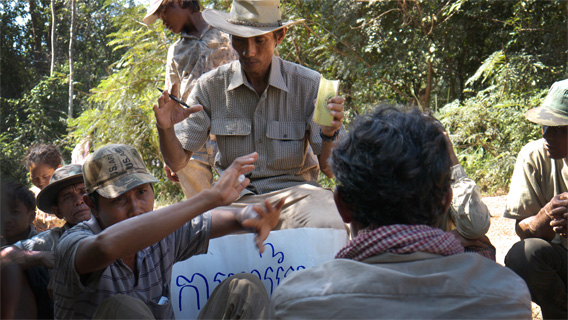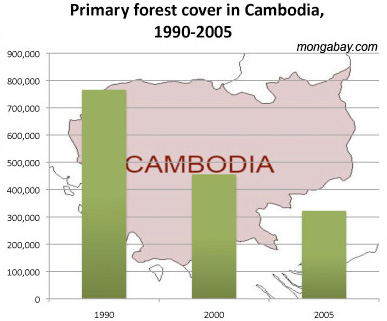Guest commentary by Fran Lambrick
www.news.mongabay.com
May 02, 2012
 Chut Wutty with Prey Lang Network representatives, November 2011. Copyright Fran Lambrick 2011. All rights reserved.
Chut Wutty with Prey Lang Network representatives, November 2011. Copyright Fran Lambrick 2011. All rights reserved.
Chut
Wutty, a dedicated Cambodian activist, was shot dead at an illegal
logging site by military police, on Thursday. At the time Wutty was
driving with two journalists, who wrote a shocking eyewitness account
of his death, revealing that he was physically and verbally abused,
then shot whilst trying to drive away, and left to die. His death
reveals the brutal power of logging syndicates and companies, which are
looting the country’s natural wealth, and employing the military to
silence their opponents.
Top: Chut Wutty was being savagely beaten by police. He was only saved by the tribal people he worked tirelessly to serve from extinction due to deforestation.
Wutty was the director of the Natural Resources Protection Group. He was the most vociferous activist speaking out against illegal logging, particularly active in the Cardamom mountains and in Prey Lang forest. He played a major role supporting the Prey Lang Network, a grassroots forest protection movement that spans four provinces.
Local authorities and officials offer little support in the fight against illegal logging. As Wutty explained, “civil servants, in their uniform, have not performed their role according to their mandate. The only role they play is facilitating business deals to make personal profit. With this they earn from more than one source. First, they get their salary from government, second, they get direct income from selling timber, and third, they make money facilitating business deals.”
“I understand that wealth is important and I want to be wealthy as well. But I also want to see people live with freedom, to be able to maintain their culture, their traditions, to be able to pursue their own life style.”
Deforestation in Cambodia is driven by a juggernaut of powerful interests. Collusion between officials, concessionaires, logging syndicates and the military creates a powerful front. The number of land concessions in Cambodia is rapidly increasing: rubber, mining and dams are major causes of large-scale deforestation. Despite losing out on valuable timber revenue from illegal logging in concession areas, the Cambodian government aims to expand rubber plantations to 400,000 hectares by 2020. Forest dependent communities face losing their land and independence, becoming poorly paid laborers in plantations owned by the wealthy.

|
Few activists or NGOs have the courage to voice their concerns about
this widespread dispossession. Wutty was perfectly aware of the risks he
was taking but he was determined to speak out. Sitting next to him as
the military approached at the Prey Lang protest in November, Wutty was
composed. "They are coming to catch me; should I run away? But where to
go?" He looked around for a second, then mildly commented, "Well, I'd
like to see what they do."
On Thursday, Wutty’s death showed just how far those people would go in the face of his courageous and untiring dedication to stop the destruction of Cambodia's forests. It is a triumph that he kept pursuing justice in the face of threats and violence.
The question now is, who sent the soldiers to apprehend Wutty?
Human rights groups have launched inquiries pursuing precisely this question. Cambodian Centre for Human Rights president Ou Virak said yesterday that his organization had strong leads on which company asked the military police to stop Chut Wutty.
The truth may not come out immediately, but a full investigation should now be launched. The Cambodian government must be pushed to control the illegal logging and land-grabbing in Cambodia, that involve an oppression and violence revealed so tragically by Wutty’s killing.
On Thursday, Wutty’s death showed just how far those people would go in the face of his courageous and untiring dedication to stop the destruction of Cambodia's forests. It is a triumph that he kept pursuing justice in the face of threats and violence.
The question now is, who sent the soldiers to apprehend Wutty?
Human rights groups have launched inquiries pursuing precisely this question. Cambodian Centre for Human Rights president Ou Virak said yesterday that his organization had strong leads on which company asked the military police to stop Chut Wutty.
The truth may not come out immediately, but a full investigation should now be launched. The Cambodian government must be pushed to control the illegal logging and land-grabbing in Cambodia, that involve an oppression and violence revealed so tragically by Wutty’s killing.
Fran is currently seeking support to make Rubbernaut,
a documentary on deforestation in Cambodia featuring Chut Wutty. You
can see his work, including information on the situation with
deforestation in Cambodia and interviews with Wutty, at www.rubbernaut.co.uk

1 comment:
A man who sacrificed everything for a good cause of his country, look at his face we can feel the pains.
Post a Comment